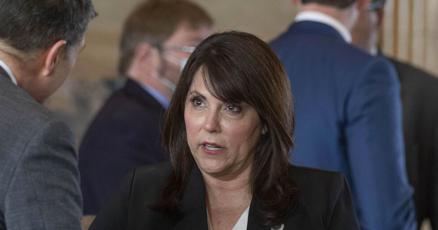The Louisiana Senate Education Committee Wednesday advanced without objection from lawmakers two anti-LGBTQ bills, targeting what names and pronouns teachers can call students and discussions in schools about gender identity and sexual orientation.
The moves came after the committee heard testimony from several members of the LGBTQ community and educators against both bills.
“I don’t know how y’all continue to hear things from us about our pain and our trauma and just still pass bills,” said Peyton Rose Michelle, executive director of Louisiana Trans Advocates, who said she was bullied in Louisiana schools starting in first grade. “I don’t know how y’all sit through these things and you don’t break down.”
House Bill 121 by Rep. Raymond Crews, a Bossier City Republican, would make it much harder for LGBTQ students to go by their chosen names and pronouns in schools.
Under the bill, LGBTQ students would only be able to go by different names and pronouns at school if both their parents and teachers agree to it. Parents would have to give permission, and teachers could still object. The bill makes exemptions for nicknames that are “derivatives” of someone’s legal name.
Schools also wouldn’t be able to discipline employees or students for deadnaming or misgendering someone, or calling them by a name or pronouns they no longer go by, even though studies have shown that calling LGBTQ students by their chosen name and pronouns decreases their likelihood of suicide, depression and anxiety.
“Calling a child by the name they choose is no more threatening to anyone than calling a kid by a nickname, except for transgender students it means so much more,” said Jamie Segura, a lesbian resident of St. Tammany Parish.
Melissa Flournoy, board chair of 10,000 Women Louisiana and a member of the LGBTQ community, said the bill was “not about names.”
“This bill really is about meanness. It’s about a culture war. It’s performative, and it’s a waste of time,” she said.
House Bill 122 by Rep. Dodie Horton, a Haughton Republican, would ban K-12 school employees and presenters from discussing their “personal sexual orientation or gender identity” during class or extracurricular activities.
It’s a version of the “Don’t Say Gay” bill other states have passed, following Florida’s lead.
However, a March out-of-court settlement between Florida education officials and civil rights attorneys watered down the state’s law. Under that agreement, teachers and students can talk about sexual orientation and gender as long as it’s not part of class instruction, and Gay-Straight Alliance groups will still be allowed.
“Having sexualized personal discussions between educators and students in our classrooms are not appropriate, and they can rob our children other innocence while imposing suggested influence over their developing young minds,” said Horton, though she said she believed “99% of educators” in the state were not doing this.
Horton claimed that she knew of two Louisiana educators acting in a way she believed would violate the bill, though she did not say how.
At least one appears to be a transgender non-binary teacher who posted on Facebook that their students were confused and asking questions about their appearance. They said they were ignoring and redirecting questions because they weren’t “allowed to tell kids I’m trans or non-binary or I’m not a girl.”
“I’m mostly just enjoying all the confusion about ‘what’ I am,” the teacher wrote, a line that was taken out of context and used as fodder for Fox News and other anti-trans outlets and activists in 2022.
Horton’s bill also would outlaw classroom discussion about sexual orientation or gender “in a manner that deviates from state content standards or curricula developed or approved by the public school governing authority.”
Jacob Newsom, a public school teacher in Ascension Parish, said he worried about what would be considered “deviating” from such standards.
“It’s, in my opinion, purposely vague to create a chilling effect in the classroom in which the teacher is uncertain of what is and is not acceptable,” he said. “I just think this bill is going to open up the school systems to frivolous lawsuits, especially from astroturf groups that are here to enforce their own agenda.”
Sen. Rick Edmonds, a Baton Rouge Republican and chairman of the committee, disagreed. “When we get into these weeds, we stretch it so far as if you couldn’t teach anything, and I just don’t see that,” he said.
MJ Hebert, a transgender high school social worker, agreed with Newsom, calling the language in the bill “insidious and harmful.”
“We all had to be in the closet when we were kids,” Hebert said. “You’re telling us, ‘Go back. You’re not welcome here.’”
Sen. Valarie Hodges, a Denham Springs Republican, replied by asking Hebert what school they worked at. When they declined to say, Hodges then asked Hebert if they discussed their sexual orientation with students.
“I’m not allowed to tell you what I discuss with a student,” Hebert said. “That would be breaking ethics and confidentiality.”
Last year legislators passed versions of both bills, but they never became law because then-Gov. John Bel Edwards, a Democrat, vetoed them.
Meanwhile, current Republican Gov. Jeff Landry has actively fought against LGBTQ rights throughout his political career.
As attorney general, he signed onto a letter opposing a Biden administration rule requiring state foster care agencies to protect LGBTQ youth in their care from discrimination and sued to revoke Edwards’ executive order outlawing anti-LGBTQ workplace discrimination. As a U.S. representative, he called on the University of Louisiana at Lafayette to stop offering a minor in LGBTQ studies.
The bills will next go to the full Senate. If the Senate passes them, they’ll need to be signed into law by Landry.







